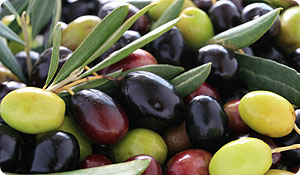
Fat has gotten a pretty bad rap, and in all fairness, much of it is well deserved. Consuming too much saturated fat can up your LDL (or bad cholesterol) level, while trans fat, once considered to be a healthy alternative to animal fat, not only raises your LDL level, it also lowers your HDL, or good, cholesterol level. Additionally, it may contribute to a higher level of triglycerides in your blood, which can harden arterial walls and cause inflammation that may facilitate fatty blockages in the blood vessels leading to your heart.
But not all fat is equally evil. In fact, your body needs fat to perform functions such as absorbing essential vitamins and minerals. Here's a breakdown of the good fats, where you can find them, and what they can do for you:
Monounsaturated fats
Found in: Avocados, canola oil, sesame seed oil, olive oil, olives, nuts, peanut butter.
This fatty acid, called monounsaturated because it has just one double-bonded carbon in its chain, has been shown to be the opposite of trans fat, benefiting the heart by reducing bad cholesterol while elevating good cholesterol. It has also been linked to a lower breast-cancer risk. With a monounsaturated-fat content of 75 percent, olive oil is one of the best sources of this good-for-you substance. Just remember to moderate your intake: Your total fat consumption should not exceed 25 to 35 percent of your daily caloric tally.
Omega-3 fatty acid
Found in: Salmon, tuna, flax seed.
A member of the polyunsaturated-fat family, omega-3 is an essential fatty acid (EFA). The body needs EFAs to maintain brain function and bone health, stimulate hair follicles and skin cells, and keep the metabolism and reproductive system in balance. But the body can't produce EFA on its own and therefore must derive it from food. Researchers in Costa Rica concluded in a report published last year that high levels of omega-3 can reduce heart-attack risk by as much as 59 percent. The American Heart Association recommends that you eat two servings of fish rich in the fatty acid at least once a week.
Omega-6 fatty acid
Found in: Eggs, poultry, most vegetable oils, pumpkin seeds.
Another polyunsaturated EFA, omega-6 in excess quantities-the American diet is said to have 11 to 30 times more omega-6 than omega-3 whereas a healthy diet should consist of one omega-3 for every four omega-6-has been associated with diseases such as cancer, arthritis, asthma, and depression. But a study published last July in an online edition of Hypertension found that lineolic acid, an omega-6 contained in vegetables, can lower blood pressure. Again, the bottom line is moderation and balance





